Disregard "We have detected a potential risk of unsecured connection"
![]() Written by Tomas Meskauskas on (updated)
Written by Tomas Meskauskas on (updated)
What is the "We have detected a potential risk of unsecured connection" fake alert?
"We have detected a potential risk of unsecured connection" is a scam promoted on various deceptive sites. This scheme targets Apple device users.
It makes false claims about users' Internet connection not being secure - in order to trick them into downloading/installing and/or purchasing untrustworthy software products. Typically, scams of this type endorse fake anti-viruses, adware, browser hijackers, and other PUAs (Potentially Unwanted Applications).
These schemes may even proliferate malware, e.g., trojans, ransomware, cryptocurrency miners, etc. Visitors to scam websites seldom access them intentionally; most get redirected to the pages by intrusive advertisements or installed PUAs.
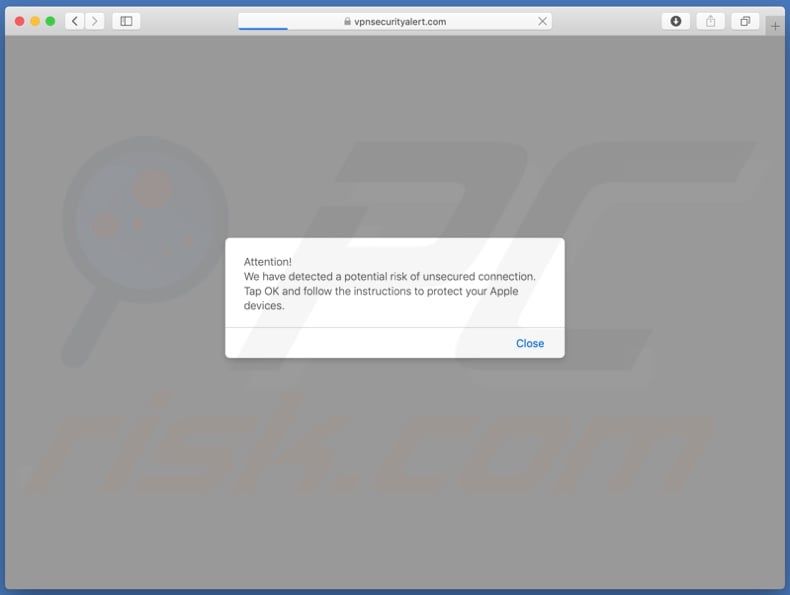
When a webpage running the "We have detected a potential risk of unsecured connection" scam is accessed, it displays a pop-up window. Text presented in it states that the site has detected that users' connection is unsecured, which is a potential risk.
It must be emphasized that no webpage can actually detect threats/issues present on visitors' systems; hence, any that may such claims are scams. The pop-up then instructs users to follow the instructions provided in the next page - to protect their Apple devices. The second page displays a pop-up window.
The message in it - informs users that a new update has been released for the endorsed VPN software. Without it installed, the device might be vulnerable to data theft, i.e., at risk of having banking and other private information stolen.
To avoid these issues, the scheme urges users to download/install the promoted app. Consenting redirects to a different webpage, which requests users to provide their telephone numbers.
This will supposedly be used to send a one-time SMS that contains a link, through which users will be able to download/install the VPN.
The message also states that standard messaging rates may apply. It is strongly recommended against trusting the "We have detected a potential risk of unsecured connection" scam, as that can result in system infections, severe privacy issues, financial losses, and even identity theft.
Online schemes often promote various PUAs. Unwanted software appears legitimate and offers "useful" features, which are rarely operational. Fake anti-virus tools are prime examples of this kind of PUAs.
They require activation (i.e., purchase) to perform the promised functionalities, yet even after activation - the functions remain nonoperational. Furthermore, PUAs can have unmentioned, heinous abilities.
Some of these apps force-open misleading, deceptive, and malicious websites (e.g., ones running "We have detected a potential risk of unsecured connection"). Adware-types run intrusive advertisement campaigns. The delivered ads diminish the browsing experience and pose a threat to device/user safety.
Once clicked on, intrusive adverts redirect to dangerous sites, and some can stealthily download/install software. Browser hijackers are another kind of PUAs; they operate by making alterations to browser settings and restricting/denying access to them - in order to promote fake search engines.
The promoted web searchers usually cannot provide search results, so they redirect to Yahoo, Bing, Google, and other legitimate search engines.
What is more, most PUAs can track data. Information of interest includes: browsing and search engine histories, IP addresses, geolocations, and even personally identifiable details. The collected data is then monetized by being shared with and/or sold to third-parties (potentially, cyber criminals).
Therefore, it is highly recommended to remove all suspicious applications and browser extensions/plug-ins immediately upon detection.
The "We have detected a potential risk of unsecured connection" scheme also has phishing scam elements. It requests users to provide their telephone numbers, which can then be charged with SMS and/or phone call fees.
Alternatively, scammers can sell the data (e.g., numbers) to third-parties, like advertisers, cyber criminals, etc. The numbers can be used to further other scams as well. It is noteworthy that successfully scammed victims are often targeted repeatedly.
| Name | We have detected a potential risk of unsecured connection pop-up |
| Threat Type | Phishing, Scam, Mac malware, Mac virus |
| Fake Claim | Scam claims users' Internet connection is unsafe. |
| Related Domains | vpnsecurityalert[.]com |
| Detection Names (vpnsecurityalert[.]com) | Spamhaus (Phishing), Certego (Spam), Fortinet (Spam), Full List (VirusTotal) |
| Serving IP Address (vpnsecurityalert[.]com) | 192.64.117.32 |
| Promoted Unwanted Application | Various dubious applications |
| Symptoms | Your Mac becomes slower than normal, you see unwanted pop-up ads, you are redirected to dubious websites. |
| Distribution methods | Deceptive pop-up ads, free software installers (bundling), fake Flash Player installers, torrent file downloads. |
| Damage | Internet browser tracking (potential privacy issues), display of unwanted ads, redirects to dubious websites, loss of private information. |
| Malware Removal (Mac) | To eliminate possible malware infections, scan your Mac with legitimate antivirus software. Our security researchers recommend using Combo Cleaner. |
"Hackers are watching you!", "VPN Update", "Device Infected After Visiting An Adult Website", and "Your system is heavily damaged by Two viruses!" are some examples of scams similar to "We have detected a potential risk of unsecured connection".
There are thousands of deceptive webpages on the Internet. Popular scam models include (but are not limited to): warnings that the device is infected or at risk, alerts that a piece of software is outdated or missing, fake prize giveaways and raffles, unbelievable deals and offers, and so on.
Regardless of what such schemes claim, offer, request, or demand, the end-goal is always the same - to generate profit for their designers. Due to how widespread scams are, it is important to exercise caution when browsing.
How did potentially unwanted applications install on my computer?
PUAs can have "official" download webpages, which can be promoted deceptive/scam sites. These applications can also be downloaded/installed together with other programs. This false marketing method of packing regular software with unwanted or malicious additions - is termed "bundling".
Rushed download/installation processes (e.g., ignored terms, skipped steps, etc.) increase the risk of unintentionally allowing bundled content into the device. When clicked on, intrusive advertisements can execute scripts to download/install PUAs without user permission.
How to avoid installation of potentially unwanted applications?
It is recommended to research software before download/installation and/or purchase. Additionally, all downloads must be performed from official and verified sources.
Untrustworthy download channels, e.g., unofficial and free file-hosting websites, Peer-to-Peer sharing networks, and other third-party downloaders - commonly offer harmful and/or bundled content. Download and installation processes must be approached with care.
That entails - reading terms, studying possible options, using the "Custom/Advanced" settings and declining to download/install supplementary apps, tools, functions, etc.
Intrusive adverts appear ordinary and innocuous; however, they redirect to various unreliable and questionable sites (e.g., gambling, pornography, adult-dating, and so forth).
In case of encounters with ads and/or redirects of this type, the system must be inspected and all dubious applications and browser extensions//plug-ins detected - removed from it without delay.
If your computer is already infected with PUAs, we recommend running a scan with Combo Cleaner Antivirus for macOS to automatically eliminate them.
Text presented in the first pop-up window displayed by the "We have detected a potential risk of unsecured connection" scam:
Attention!
We have detected a potential risk of unsecured connection. Tap OK and follow the instructions to protect your Apple devices.
Close
Screenshot of "We have detected a potential risk of unsecured connection" scam's second webpage:
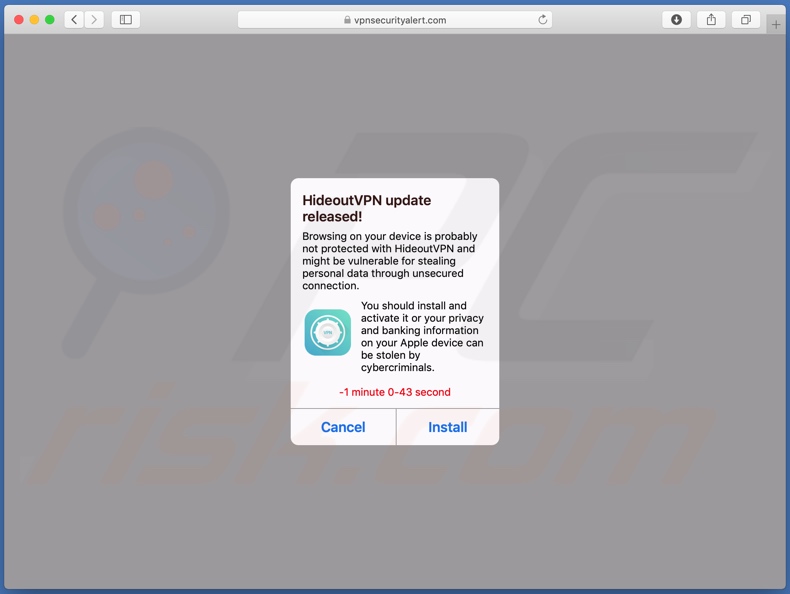
Appearance of the mobile variant's second webpage:
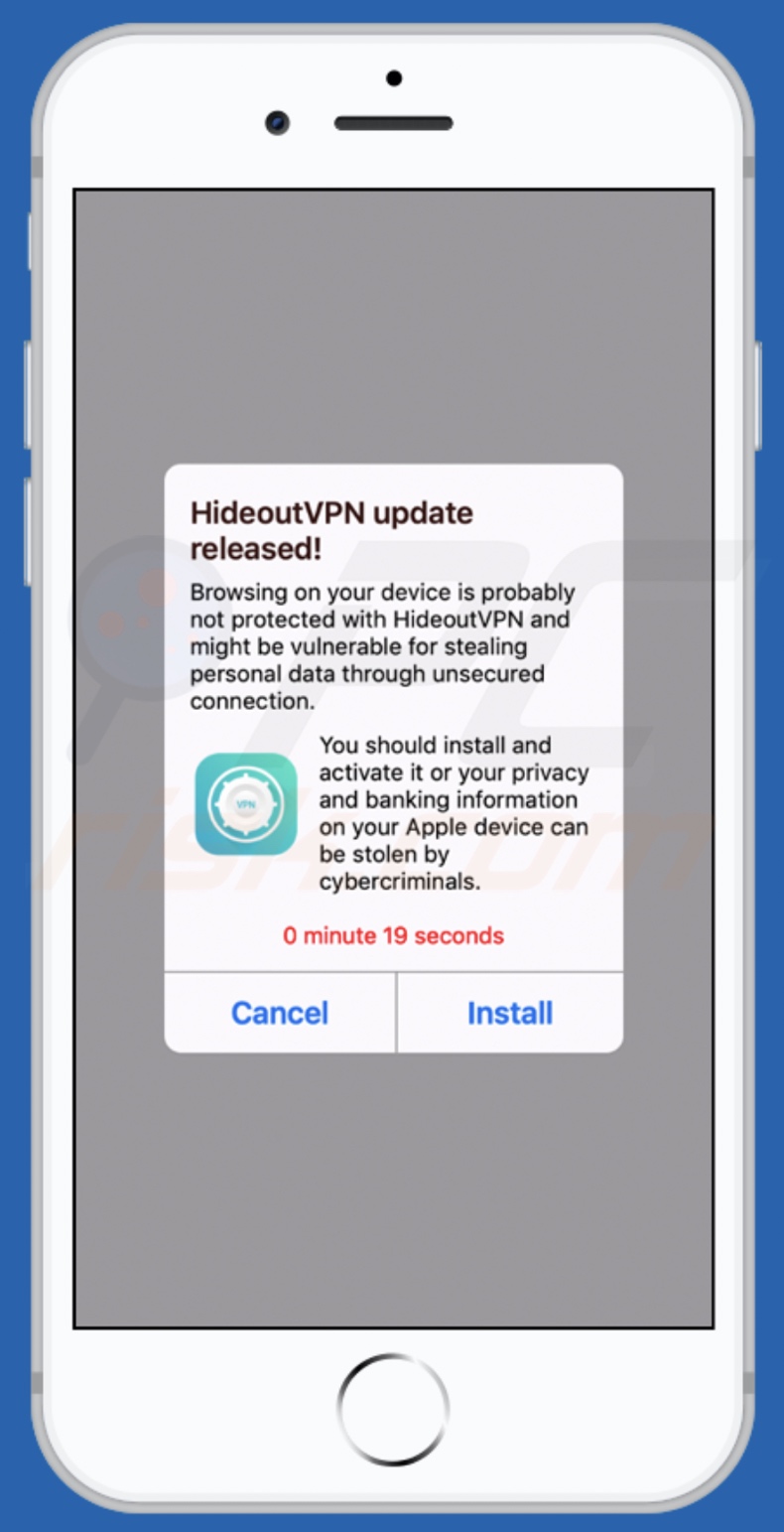
Text presented in this webpage:
HideoutVPN update released!
Browsing on your device is probably not protected with HideoutVPN and might be vulnerable for stealing personal data through unsecured connection.
You should install and activate it or your privacy and banking information on your Apple device can be stolen by cybercriminals.
0 minute 15 seconds
Cancel Install
Screenshot of "We have detected a potential risk of unsecured connection" scam's third webpage:
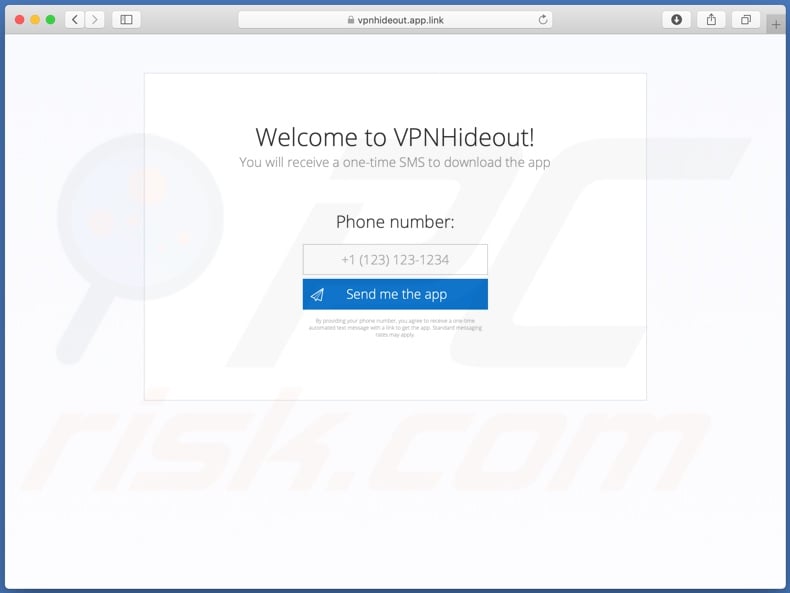
Appearance of the mobile variant's third webpage:
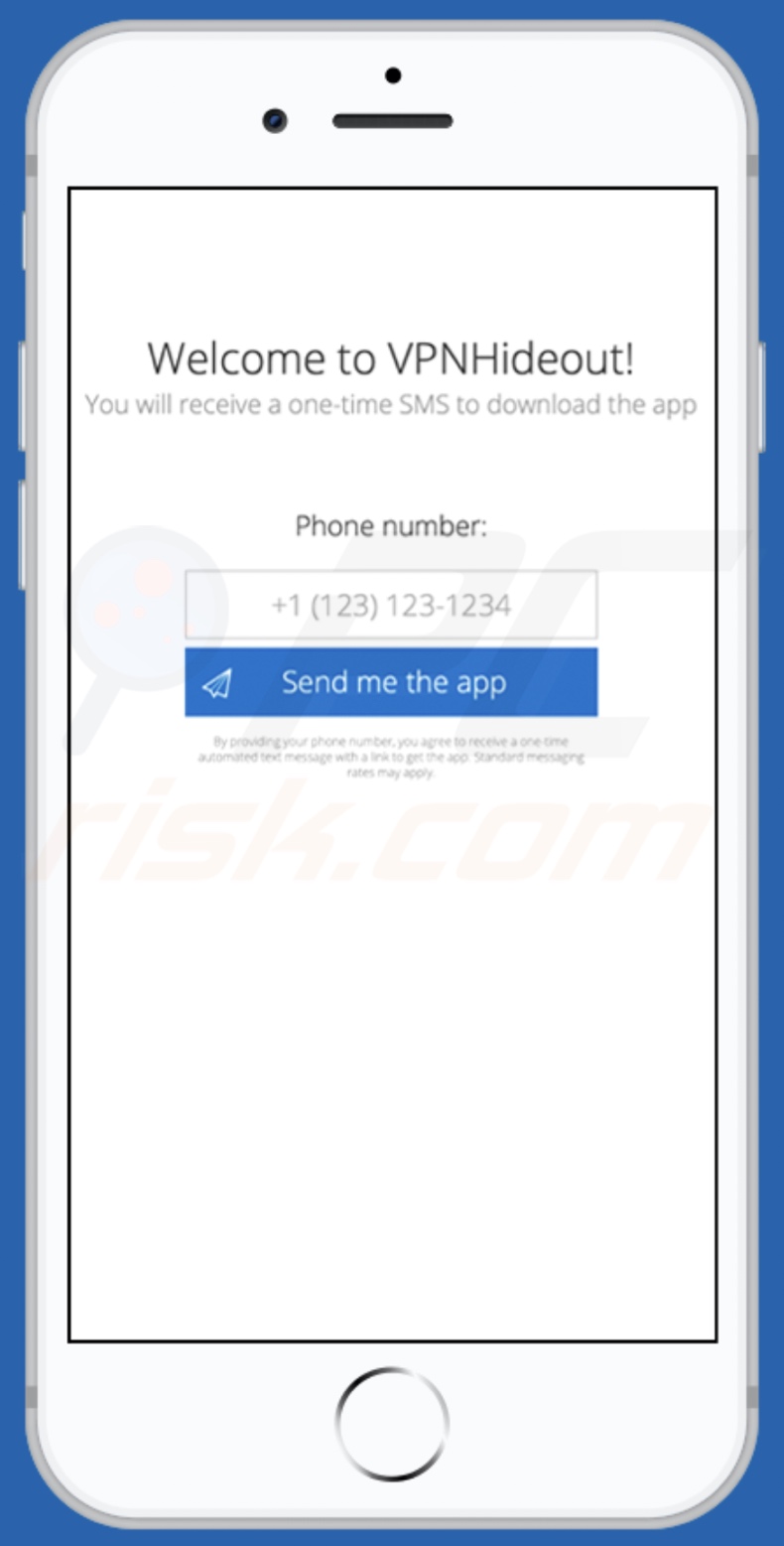
Text presented in this webpage:
Welcome to VPNHideout!
You will receive a one-time SMS to download the app
Phone number:
Send me the app
By providing your phone number, you agree to receive a one-time automated text message with a link to get the app. Standard messaging rates may apply.
To enable pop-up blocking, fraudulent website warnings, and remove web browsing data in mobile Apple devices, follow these steps:
First, go to "Settings", and then scroll down to find and tap "Safari".
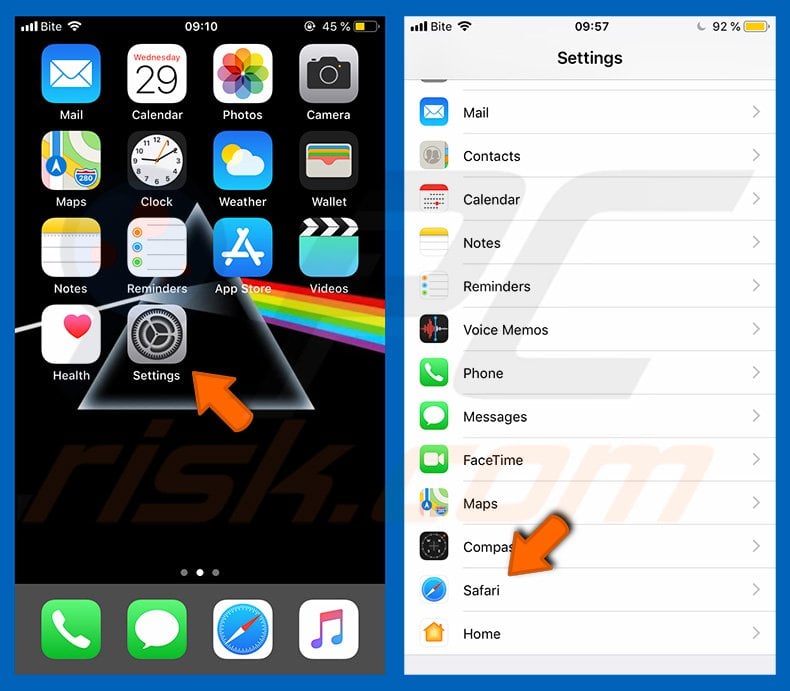
Check if the "Block Pop-ups" and "Fraudulent Website Warning" toggles are enabled. If not, enable them immediately. Then, scroll down and tap "Advanced".
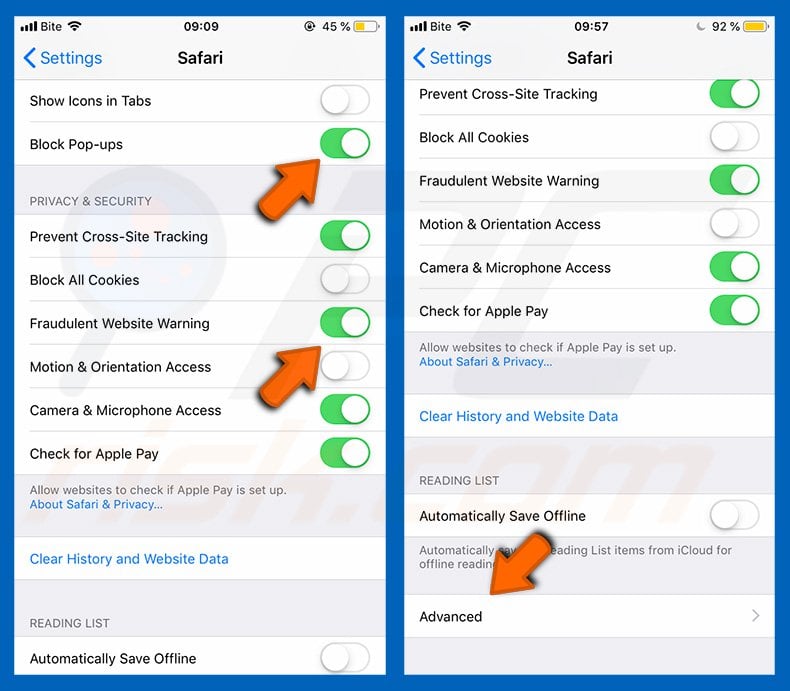
Tap "Website Data" and then "Remove All Website Data".
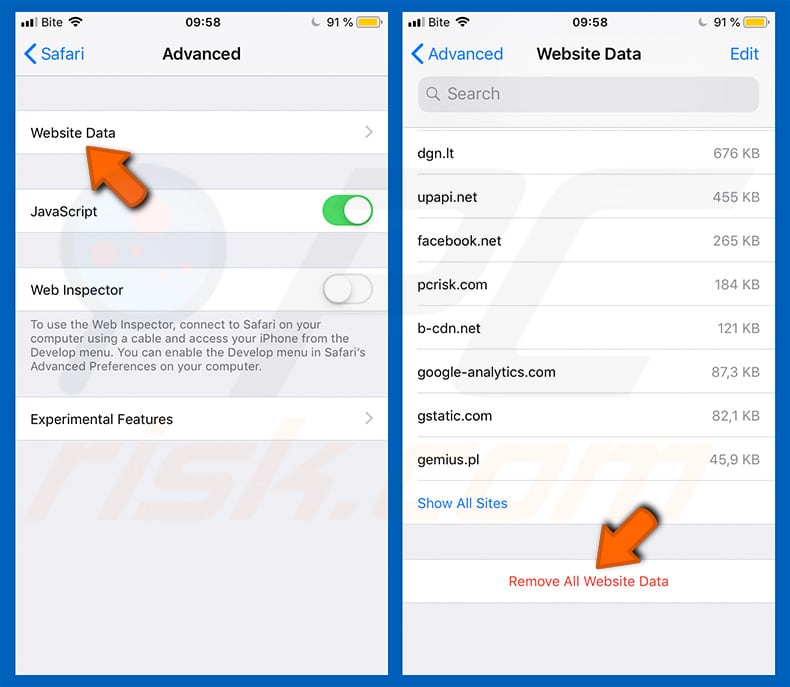
Instant automatic Mac malware removal:
Manual threat removal might be a lengthy and complicated process that requires advanced IT skills. Combo Cleaner is a professional automatic malware removal tool that is recommended to get rid of Mac malware. Download it by clicking the button below:
▼ DOWNLOAD Combo Cleaner for Mac
By downloading any software listed on this website you agree to our Privacy Policy and Terms of Use. To use full-featured product, you have to purchase a license for Combo Cleaner. Limited seven days free trial available. Combo Cleaner is owned and operated by Rcs Lt, the parent company of PCRisk.com read more.
Quick menu:
- What is We have detected a potential risk of unsecured connection pop-up?
- How to identify a pop-up scam?
- How do pop-up scams work?
- How to remove fake pop-ups?
- How to prevent fake pop-ups?
- What to do if you fell for a pop-up scam?
How to identify a pop-up scam?
Pop-up windows with various fake messages are a common type of lures cybercriminals use. They collect sensitive personal data, trick Internet users into calling fake tech support numbers, subscribe to useless online services, invest in shady cryptocurrency schemes, etc.
While in the majority of cases these pop-ups don't infect users' devices with malware, they can cause direct monetary loss or could result in identity theft.
Cybercriminals strive to create their rogue pop-up windows to look trustworthy, however, scams typically have the following characteristics:
- Spelling mistakes and non-professional images - Closely inspect the information displayed in a pop-up. Spelling mistakes and unprofessional images could be a sign of a scam.
- Sense of urgency - Countdown timer with a couple of minutes on it, asking you to enter your personal information or subscribe to some online service.
- Statements that you won something - If you haven't participated in a lottery, online competition, etc., and you see a pop-up window stating that you won.
- Computer or mobile device scan - A pop-up window that scans your device and informs of detected issues - is undoubtedly a scam; webpages cannot perform such actions.
- Exclusivity - Pop-up windows stating that only you are given secret access to a financial scheme that can quickly make you rich.
Example of a pop-up scam:

How do pop-up scams work?
Cybercriminals and deceptive marketers usually use various advertising networks, search engine poisoning techniques, and shady websites to generate traffic to their pop-ups. Users land on their online lures after clicking on fake download buttons, using a torrent website, or simply clicking on an Internet search engine result.
Based on users' location and device information, they are presented with a scam pop-up. Lures presented in such pop-ups range from get-rich-quick schemes to fake virus scans.
How to remove fake pop-ups?
In most cases, pop-up scams do not infect users' devices with malware. If you encountered a scam pop-up, simply closing it should be enough. In some cases scam, pop-ups may be hard to close; in such cases - close your Internet browser and restart it.
In extremely rare cases, you might need to reset your Internet browser. For this, use our instructions explaining how to reset Internet browser settings.
How to prevent fake pop-ups?
To prevent seeing pop-up scams, you should visit only reputable websites. Torrent, Crack, free online movie streaming, YouTube video download, and other websites of similar reputation commonly redirect Internet users to pop-up scams.
To minimize the risk of encountering pop-up scams, you should keep your Internet browsers up-to-date and use reputable anti-malware application. For this purpose, we recommend Combo Cleaner Antivirus for macOS.
What to do if you fell for a pop-up scam?
This depends on the type of scam that you fell for. Most commonly, pop-up scams try to trick users into sending money, giving away personal information, or giving access to one's device.
- If you sent money to scammers: You should contact your financial institution and explain that you were scammed. If informed promptly, there's a chance to get your money back.
- If you gave away your personal information: You should change your passwords and enable two-factor authentication in all online services that you use. Visit Federal Trade Commission to report identity theft and get personalized recovery steps.
- If you let scammers connect to your device: You should scan your computer with reputable anti-malware (we recommend Combo Cleaner Antivirus for macOS) - cyber criminals could have planted trojans, keyloggers, and other malware, don't use your computer until removing possible threats.
- Help other Internet users: report Internet scams to Federal Trade Commission.


▼ Show Discussion